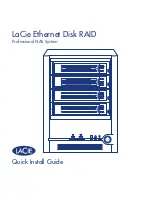
Advanced Configuration
74
6.10 ARP
6.10.1 Overview
The Address Resolution Protocol (ARP) resolves the mapping between IP addresses and
MAC addresses by the address request and response mechanism. The switch can learn the
mapping between IP addresses and MAC addresses of other hosts on the same network
segment. It also supports static ARP entries for specifying mapping between IP addresses
and MAC addresses. Dynamic ARP entries periodically age out, ensuring consistency
between ARP entries and actual applications.
The series switches provide not only Layer 2 switching function, but also the ARP function
for resolving the IP addresses of other hosts on the same network segment, enabling the
communication between the NMS and managed hosts.
6.10.2 Description
ARP entries fall into dynamic and static ones.
Dynamic entries are generated and maintained based on the exchange of ARP packets.
Dynamic entries can expire, be updated by a new ARP packet, or be overwritten by a static
ARP entry.
Static entries are manually configured and maintained. They never expire or are overwritten
by dynamic ARP entries.
The switch supports up to 512 ARP entries (256 static ones at most).When the number of
ARP entries is larger than 512, new entries automatically overwrite old dynamic entries.
6.10.3 Web Configuration
1. Configure ARP aging time, as shown in the following figure.
Figure 72 Configuring Aging Time
ARP Aging Time
Summary of Contents for SICOM3024P
Page 13: ...Product Introduction 6 management software and SNMP network monitoring...
Page 25: ...Device Status 18 Figure 15 System Operating Information SICOM3024...
Page 73: ...Advanced Configuration 66 Figure 67 Setting ACL Entry Parameters Group 2...
Page 145: ...Advanced Configuration 138 Figure 137 Dynamic Unicast FDB Table...
















































